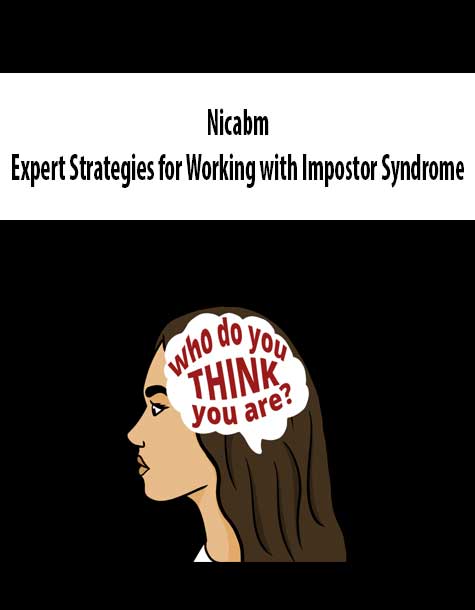Nicabm – Expert Strategies for Working with Impostor Syndrome | Available Now !
$197.00 Original price was: $197.00.$56.00Current price is: $56.00.
Nicabm – Expert Strategies for Working with Impostor Syndrome | Instant Download !
PLEASE CHECK ALL CONTENTS HERE:
Sale Page_https://www.nicabm.com/program/impostor-syndrome/?del=store
Archive: https://archive.fo/irhnH
Impostor Syndrome Could Be Destroying Your Client’s Future – Especially If She’s a Woman
Almost everyone has experienced the pain of feeling inadequate, unworthy, or never good enough.
But while some can easily bluff their way into greater success and better opportunities, those who suffer from impostor syndrome can become locked in an exhausting cycle of questioning their abilities, discounting their achievements, and comparing themselves to others (while always coming up short).
When impostor syndrome is deeply ingrained in a client’s way of thinking, it can lead to shame, anxiety and depression. Not only that, it can take a heavy toll on the relationships that clients hold most dear.
And here’s the thing – impostor syndrome can happen to anyone, but there are certain people who are disproportionately susceptible to it.
So how can we neutralize the powerful forces that fuel impostor syndrome and help clients shift out of an impostor mindset?
We turned to 21 of the world’s top experts to hear how they work with clients who suffer from impostor syndrome . . .
. . . and collected their best strategies into this brand-new course . . .
Expert Strategies for Helping Clients Who Struggle with Impostor Syndrome
How to Identify What’s Triggering Your Client’s Impostor Syndrome (and Practical Strategies for Working with Each)
Ron Siegel, PsyD Shelly Harrell, PhD
Rick Hanson, PhD Lynn Lyons, LICSW
- How Feelings of Never Good Enough Are Intrinsically Linked to Impostor Syndrome (and One Way to Help Your Client Address Them)
- Three Expert Strategies for Working with the Self-Doubt That Fuels Impostor Syndrome
- How to Help Your Client When Impostor Syndrome Leads Them into a Futile Quest for Perfection
How to Work with the Specific Social Patterns That Can Perpetuate Impostor Syndrome
Kelly McGonigal, PhD Christine Padesky, PhD
Christopher Willard, PsyD Rick Hanson, PhD
Joan Borysenko, PhD Miguel Gallardo, PsyD
- The Key Link Between Impostor Syndrome and Belonging (and How This Impacts Your Client’s Success)
- Why Experiencing Success Can Spark Your Client’s Impostor Syndrome
- How to Work with the Harmful Coping Strategies That Sustain Your Client’s Impostor Syndrome
How to Work with Impostor Syndrome at the Level of the Nervous System
Stephen Porges, PhD Deb Dana, LCSW
- How Your Client’s Physiological State Can Influence Impostor Syndrome
- Understanding Impostor Syndrome Through the Lens of Dissociation
- Strategies to Help Your Client Regulate Their Nervous System (and Why This Is Critical for Neutralizing Impostor Syndrome)
How to Work with the Body to Shift Clients Out of Impostor Syndrome
Pat Ogden, PhD Kelly McGonigal, PhD Joan Borysenko, PhD
- Specific Movements That Can Help Your Client Reverse Deeply Ingrained Impostor Syndrome
- The Link Between a Client’s Sense of Self and Their Body (and How This Can Shape Our Work with Impostor Syndrome)
How to Work with Impostor Syndrome That’s Rooted in Trauma
Janina Fisher, PhD Christopher Willard, PsyD
- Why Impostor Syndrome Can Develop in Response to Trauma
- How to Help Traumatized Clients See Their Impostor Syndrome as a Survival Skill
How to Reframe Your Client’s Experience of Impostor Syndrome
Bill O’Hanlon, LMFT Michael Yapko, PhD
Kelly McGonigal, PhD Kelly Wilson, PhD
Resmaa Menakem MSW, LICSW, SEP
- Why an Understanding of the “Tragic Gap” Can Be Key in Helping Clients Who Struggle with Impostor Syndrome
- How to Help Your Client Use Impostor Syndrome as Fuel for Growth
How to Work with the Impact of Impostor Syndrome on Your Client’s Relationships
Richard Schwartz, PhD Stan Tatkin, PsyD, MFT
Kelly McGonigal, PhD Deany Laliotis, LICSW Ron Siegel, PsyD
- How to Work with Clients Whose Impostor Syndrome Affects Their Ability to Cultivate Intimacy with a Romantic Partner
- How to Help Clients Who Hide Behind “Impostor Parts” to Guard Against Hurt, Rejection, and Abandonment
What Can Go Wrong When Treating Impostor Syndrome
Resmaa Menakem MSW, LICSW, SEP Ron Siegel, PsyD
Christopher Willard, PsyD
- One Common Mistake Practitioners Make in Addressing a Client’s Impostor Syndrome (and How to Avoid It)
- The Importance of Setting the Right Pace When Treating Impostor Syndrome (and Key Factors to Keep in Mind)
How Practitioners Might Use a Personal Experience of Impostor Syndrome to Help Their Clients
Peter Levine, PhD Miguel Gallardo, PsyD
Ron Siegel, PsyD Michael Yapko, PhD Rick Hanson, PhD
- Three Specific Questions That Can Help Clients Reduce Their Preoccupation with Social Comparison
- How One Expert Was Able to Keep His Own Impostor Syndrome at Bay (and How You Can Use This Strategy with Your Clients)
- How to Work with Impostor Syndrome That Is Fueled by an Over-Attachment to Outcomes
Here’s What You’ll Get:
Everything is yours to keep forever in your professional library
| Downloadable videos so you can watch at your convenience, on any device | |
| Audio recordings you can download and listen to at home, in the car, at the gym or wherever you like | |
| TalkBack Segments to distill key ideas (this is where we “land” the session) | |
| Next Week in Your Practice sessions to give you concrete strategies to use with patients | |
| Professionally-formatted transcripts of the sessions, to make review and action simple | |
| Three downloadable bonus videos to help you work with clients who suffer from impostor syndrome |
1 review for Nicabm – Expert Strategies for Working with Impostor Syndrome | Available Now !
| 5 star | 100 | 100% |
| 4 star | 0% | |
| 3 star | 0% | |
| 2 star | 0% | |
| 1 star | 0% |
Sorry, no reviews match your current selections
Q & A
Ask a question
Your question will be answered by a store representative or other customers.
Thank you for the question!
Your question has been received and will be answered soon. Please do not submit the same question again.
Error
An error occurred when saving your question. Please report it to the website administrator. Additional information:
Add an answer
Thank you for the answer!
Your answer has been received and will be published soon. Please do not submit the same answer again.
Error
An error occurred when saving your answer. Please report it to the website administrator. Additional information:
Related products
Ecommerce
Ecommerce
Ecommerce
Ecommerce
NLP & Hypnosis












AAA | Nicabm – Expert Strategies for Working with Impostor Syndrome